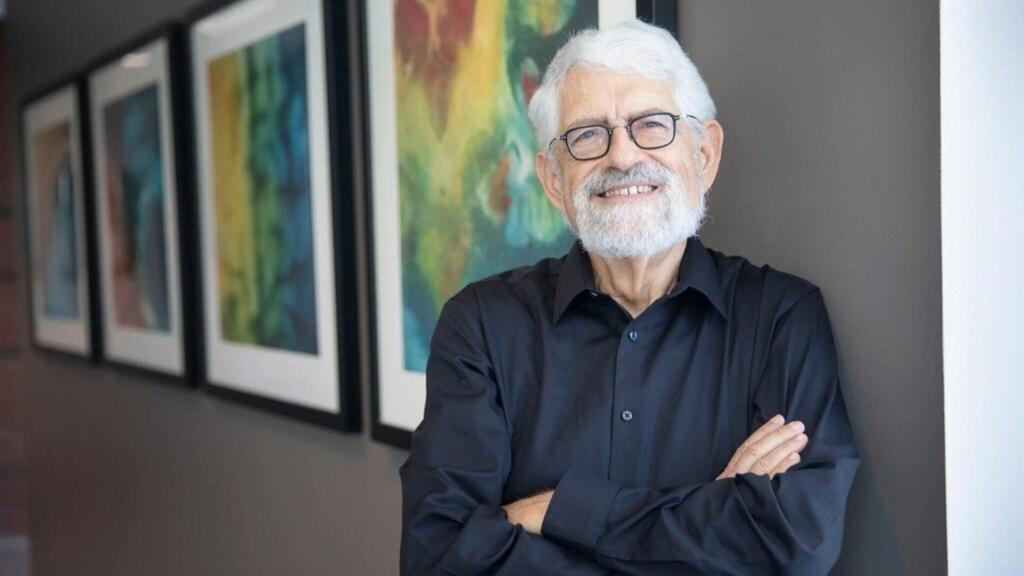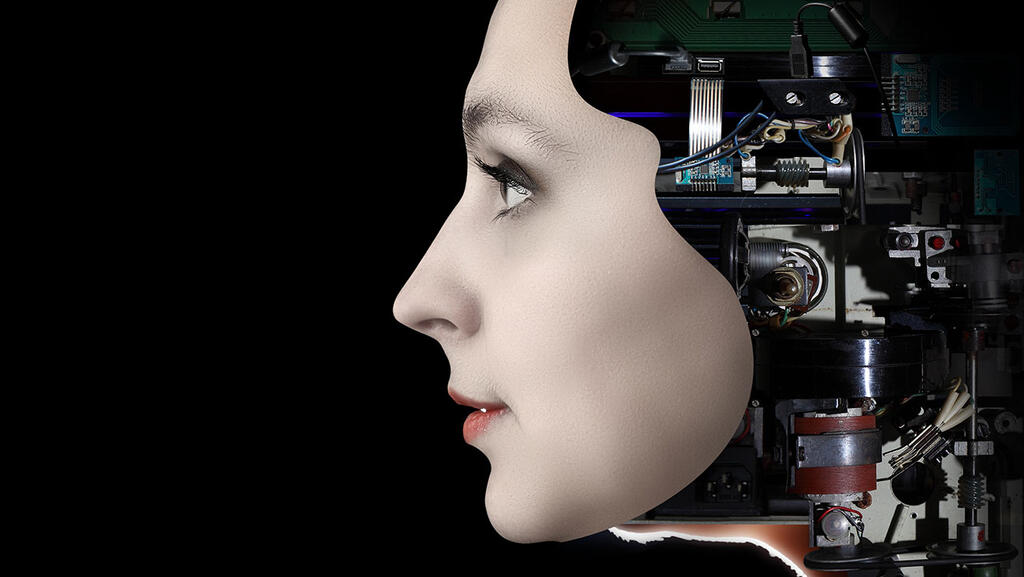"To say that 'there is a higher power that directs my actions' is to deny natural order. There is no such thing. God is the way of nature"
Particularly now when Israel is being attacked in the world on the one hand, and the government is cutting education and science budgets on the other, we can allow ourselves to savor a moment of national academic pride: Prof. Haim Sompolinsky of the Hebrew University was awarded the most prestigious international prize for neuroscience research.
The prize announced earlier this month, totaling 1.3 million euros, is shared by three winners and will be presented by the King of Denmark. In an interview, Sompolinsky talks about the groundbreaking work that made the winning possible, discovers whether artificial intelligence really thinks, and explains why everything we do is predetermined due to our brain structure (yes, also what we do with the prize money)
Professor Sompolinsky, 74, who has been considered for years the most noteworthy Israeli pioneer in brain research, now gains respect from the general public as well. Maybe Israelis will also start recognizing him. He is a typical example of a giant; As early as 1980's he began inventing theoretical and computational neuroscience - or, in other words, the missing link between biological neuroscience (how it looks and works) and cognitive neuroscience (what it does).
In fact, the magic of the human brain is created from the known physics of millions of neurons connected by synapses: how does a thought arises, how is inspiration created, how memories are stored, where does art come from, and why Beethoven wrote music like Beethoven, and why am I not like Beethoven.
Together with generations of researchers under his leadership, Sompolinsky managed to formulate, over the years, theoretical and mathematical principles that turned out to be completely accurate, followed by deciphering the brain's navigation system and the way the brain constantly balances itself between stimulation and suppression.
Sompolinsky is rather a relaxed, sympathetic person, careful to be precise in his wording, he possesses a certain modesty and integrity that can be seen in his peers from the religious-national sector although modesty is unnecessary in his case.
Having served in senior positions as professor emeritus and head of the Center for Neural Computation at the Hebrew University, followed by Harvard's Program in Theoretical Neuroscience, Sompolinsky is a shining Israeli star who can still rarely be found on the Internet. The few videos where he is featured, deal with the concept he is most identified with, that there is actually no free choice at all, everything is predetermined and a deterministic consequence of electrical and chemical activity in the brain.
"There is nothing supernatural in the choices we make."
May I ask you, what will you choose to do with the prize money?
"To everyone who asks, I answer that my wife has already spent the money," he laughs, "but, I have a large family, thank God, five children and 22 grandchildren, so it's quite obvious what the money will be used for."
Would it be correct to say that your choice how to use the money is actually predetermined in terms of the brain?
"We don't really have free will, so every decision and choice we make - we have to understand, in retrospect, that it was nature that did its thing."
On the one hand it sounds deterministic and unpleasant in general, and on the other hand, let's admit it, it also has certain advantages. We can feel a little less guilty about terrible decisions we've made, because 'hey, it was actually predicted.
"The whole matter of reward and punishment for example - the judicial dimension involved in this is not right", Sompolinsky says. "Because in retrospect I did something because I was part of nature, and to punish me for that, to say that I deserve punishment, is like saying that a tsunami deserves punishment. But this does not rule out the need to have a system of laws and punishment because we are rational beings, committed to a just society and to protecting ourselves against crime, etc., and we want to influence our decision-making and behavior in the future. This is a utilitarian approach and not one of absolute justice of 'I deserve punishment' or 'I deserve a prize'. I don't deserve it, I'm part of nature."
But here, you received a prize. And according to you, it was inevitable that you would receive it.
"Right".
God must be involved, or not. Because after all, the kippah on Sompolinsky's head is deceiving, given his doctrines. And the implicit assumption that a religious person is committed to the idea of the existence of soul and mind, or any other way in which you would prefer to patronize your dog - is also, according to Sompolinsky, only a product of vigorous brain activity.
It is further complicated if you take into account that Sompolinsky is also the son of Rabbi David Sompolinsky, who immigrated from Denmark to Bnei Brak and was himself a scientist who led the microbiology laboratory at Assaf Harofeh Hospital.
It is a rare, almost contradictory combination that existed within both the son and the father; On the one hand, engaging in strict Orthodox Jewish observance, and on the other hand – engaging in science research that almost denies divine providence. Therefore, before talking about his great science, Sompolinsky is perhaps the most appropriate person to talk about the existence of a soul and a God, as he would define it: "What you call 'mind', is an expression in human language that describes phenomena that emerge from the severity and laws of physics, biology and chemistry of the brain".
In other words: everything has to do with materials. I mean, there is a mind, but according to Sompolonsky it is "an emergent phenomenon, meaning a function that occurs at the macro level of the brain, but is a product of its microscopic constituents - it emerges only at the high level of the functions that the brain produces, and it is not disconnected from them; it's not that when the body dies, something continues to exist or float in the air - absolutely not."
So, our mind and soul are just physical activities at advanced levels?
"Unequivocally yes."
So, there is no reincarnation nor the next world.
"God forbid, no."
Sounds like you're hardly interested in it.
"True. I say this because we are intelligent beings, and the more we comprehend that we are part of this lovely and wonderful nature that controls everything and miraculously organizes the entire universe around us, the better people and society we will be. And once we realize that we are part of this great nature, we will understand that we also have obligations that go far beyond our narrow interests as humans who think they have supernatural or divine powers. We need to have the modesty and responsibility that comes from our being part of the great nature."
How does that correspond with you being a religious observant?
"For me, this is the first main principle of faith. Maimonides wrote about the 'Oneness of God', and I relate to that: it is a belief in the fact that we are part of something greater, which is the galaxies in space and the trees and nature and the peoples around us."
So, nature is divinity?
"God for me is the belief in unity and the commitment derived from it."
It's a bit abstract. Does "unity" mean nature in general or a higher power that is now examining my actions?
"God forbid. To say that 'there is a higher power that directs my actions' is to deny the natural order. There is no such thing. God is the way of nature. The Jewish religion - like any other religion - does not have an alternative physical book with other laws of nature. It surprises me that in the 21st century, intelligent people can exercise all their rational faculties in commerce, industry, education, or science, and at the same time say, 'this is a miracle' and 'if I do this, God will do this to me.' It's like having a split personality, rational and non-rational. The point is that large parts of the human race relate religious belief and religious commitment to this nonsense. It's time to cut it off."
If there is no providence or next world, what makes you continue practicing religion and observing mitzvot?
"What's the alternative?"
Becoming secular, I guess.
"Why? Doesn't a secular person commit to values? So religious practices are our way, for people who are committed to the Torah and mitzvot - to express in a certain way their commitment to these values. There is not just one way, and the diversity of cultures and traditions in human society is blessed. As a member of the Jewish people, in my opinion, this is a right and a duty to preserve the tradition and the way in which the Jewish people for generations expressed their commitment to those universal values, such as compassion and justice, which the Torah and the prophets spoke of."
Didn't you have somewhere in your life - even as a graduate of the Ponevezh Yeshiva - a crisis point in all this?
"I wouldn't call it a crisis. I went through a natural gradual maturity process, about how I perceive my faith, how I remove the unnatural and irrational elements from it. It's a process."
Didn't you think to leave the orthodox society?
"God forbid, no. To give up such a treasure, such happiness and what is embodied in it? To forsake the chain of thousands of years, which I am part of? What for? To go to the beach on Shabbat? Listen, nowadays being religious does not involve much sacrifice. Why give it up?"
Breathless progress
He started by receiving his Ph.D. in physics from Bar-Ilan University in Israel. He then worked as a postdoctoral fellow in the physics department at Harvard University, and then - with the help of the Hebrew University in Jerusalem - he pioneered the new field of computational neuroscience. In the early stage, he focused on trying to quantify the brain - and he indeed succeeded - but realized that size didn't matter.
"There are bigger brains in nature – those of elephants and whales, for example - but we have the ability to use long-term memory and information that comes in all at the time and enables us to produce new knowledge and abilities, learn a new language, calculate what will happen next, etc. - this is the flexibility of the nervous system that gives the human brain its special faculties. Inspiration and creativity are spontaneous things that happen to us all the time."
Do we already understand how this happens?
"We are still far from understanding these things because these are high functions of the brain - and the higher the function, the more difficult it is to measure the connection with the neural processes in the laboratory - but we have made great progress in understanding this connection."
In fact, Sompolinsky came much closer than he cares to admit and was already able to put into formulas the way the brain recognizes and places itself in space and decides which physical movements to perform at any given moment.
"These are functions that animals also perform – and we were lucky enough to be able to record their brain activity when they performed it - and this research advanced us significantly to an extent that today we can already investigate what happens in the brain at the higher level of language, long-term planning and drawing conclusions."
Perhaps his most important discovery was understanding how neurons are arranged in the brain - without hierarchy, without a "ruler", while groups of neurons are constantly being produced and arranged, physically, in a circular architecture, which Sompolinsky called a "ring attractor" - a structure that at first, he only guessed existed.
"We realized that the ring model is a situation in which the brain network produces lots of patterns - that is, activity in a certain place on the surface of the network - and each such ring pattern is a possible hypothesis for what is happening in the world," he explains, "and when an external signal from the world arrives, it either fits the hypothesis, then all is well, or it doesn't fit, and then the brain makes an update - that is, it moves the ring to the left or right or in any other direction, depending on the information received."
This "Ring Attractor" - which started as a theoretical assumption - turned out to be real once the technology aligned and allowed a sufficiently microscopic glimpse into the brains of flies and fish; "you can literally see the ring, the anatomic arrangement of the cells inside it, and how the signaling from the outside world moves it in the brain. Such patterns are formed even when the animal is asleep, even in the dark, in fact, all the time. It's simply amazing, and it's really an extraordinary example of a theoretical work that has received direct confirmation, even in the visual sense."
Things like this rarely happen, "Actually, you will be lucky if it happens to you once in a career", Sompolinsky says, but this was not the only time when reality followed his theoretical hypotheses. Among other things, Sompolinsky also discovered the balanced regime of brain dynamics, in which large excitatory and inhibitory inputs almost cancel each other - "this allows the cerebral network to respond in a very fast and flexible way to any small change, because the neurons are always near their activity threshold ".
All the above is proven and implemented today, first of all, in contemporary AI networks that are based, to a large extent, on models that imitate those that Sompolinsky detected in the brain, to a level that makes him wonder to what extent these machines are thinking or just pretending to think. "These systems are also based on the models I described, and constantly produce templates that adapt themselves to the demands of the outside world," he says.
Does it mean that AI imitates organic mechanisms?
"It has no chemistry, of course, but it is built on the same principles, on distributed computation, on small changes that happen in many places, and this is a computational paradigm very different from the one in which ordinary computers work. This paradigm manages to produce high functions such as language proficiency, without anyone putting in, for example, grammar rules."
Do these systems really "think" before they generate an answer?
"There is no thinking involved here, and it is not mysterious to know what is happening inside the machine while it is apparently 'thinking.' But there is a lively and poignant argument on this subject. There are groups of people that claim that the machine is a "stochastic parrot" that does not understand the meaning of the language it processes, and there are those that claim that the machines already show sparks of general intelligence - which is the holy grail - and we can start talking about awareness [of a machine]."
What do you think?
"I'm somewhere in the middle. I think that we still don't have a good enough definition of what thinking is – unlike statistical processing. I say to myself: Wait, this machine is completely stupid, you type in a sentence or a word and it calculates probabilities for the next expected word. And then I wonder if this is also what my brain is doing? so I don't have an unequivocal answer. Our approach as scientists is to get out of the philosophical questions for which we currently have no answers and focus on empirical measures. And the current AI systems, which are fantastic in many things - such as the field of language - still make mistakes in simple things. For example, give an AI a text and ask it 'what is the fourth word in a sentence', and it will get confused. Our brains also make mistakes all the time, but of a completely different kind. And that's the point; it's not about who makes more mistakes, but rather - is the mistake pattern similar, and right now it's not."
Do you think AI can become dangerous?
"Currently, in my opinion, it is only a very imperfect model of the human brain, but it could be incorporated with a higher insight into what happens in the human brain, which will make the systems closer until we can transfer information in between them. I don't think there is a problem with the basic paradigm of AI, but rather a problem with its existing systems."
Ten years from now, will AI be fully human?
"I have no doubt about that. It may not completely resemble humans, but the progress is breathtaking, and the gaps are narrowing."
Let the mind retire
At Harvard, he is, above all, an Israeli who is concerned - and not about what is happening in Israel, but rather about what is happening at Harvard. "On campus, there are demonstrations, petitions, ads about genocide, it exists all the time and it's unpleasant," he says. "And there are internal conflicts among the faculty members, some of whom hold very extreme views against Israel, and I feel that I must maintain normal relations even with colleagues who disagree with me about Israel's right to exist."
Are you voicing an opposing position?
"We have a forum of Israeli faculty members, Jews and supporters of Israel, which is trying to fight back and demand that the university take steps and especially protect students who live in the dorms and sometimes feel very threatened."
Do you feel it's difficult to advocate for the Israeli government?
"Abroad, I don't see myself as a defender of the government's positions, but rather of the country. In practice, it is very difficult for people - at Harvard and elsewhere, including those who are supportive of Israel - to disconnect Israel's serious security problem and the need to protect the country and its citizens from the criticism towards the government, and that's why they see everything negatively."
What did you think of the hearing held for the president of Harvard?
"Personally, I'm glad that she left. The president of a university who cannot express a firm position against the call for genocide - of the Jewish people in this case - is crossing all red lines. There is no moral or public ability for such a person to continue leading such a prestigious university. We were a group of faculty people who wanted her to resign, but we were a minority. The absolute majority of the faculty members supported her staying."
But when in Israel, he is an Israeli concerned about what is happening here - the constant radicalization, the fading chance for another young person like him, to take a similar path. "In my home, this was the required path - my father was an ultra-Orthodox person in many ways, but also an educated person, an academic, a professor at the university. And that's what I was taught. But today, the chance for a young boy to study in high school, then a high yeshiva, then a university and also serve in the army - is unfortunately rare. But it is possible that ultra-Orthodox men would serve in the military due to the new reality we are facing, and it will happen relatively soon. These are changes in the right direction."
Would you recommend your young grandchildren to live in Israel?
"I am raising my children and grandchildren according to the values of Zionism, and of course, I would like to see them tie their fate in the State of Israel. On the other hand, it's not easy to tell a young person today to raise a family and build a life in a place where there is no basic security. And I hear from many experts that October 7 is not an 'existential threat' - unlike Iran. In my opinion, that is wrong because an existential threat is not a tank in Tel Aviv, but rather a threat to civil society's ability to function reasonably and to prosper. And this is the first time that this security has been shaken in a very fundamental way."
Sompolinsky avoids expressing any political views and prefers to be careful, even if in private conversations with colleagues he speaks freely about the need for change and the necessity to restore the required trust in the country and its capabilities.
"I'm not against elections now, I'm just not sure that their results would be satisfactory to us," he agrees to say. "There are deep trends here that need to be fought and this would be a long-term and a cultural struggle, which must be done through education. The trend of right-wing extremism, both among the secular public and among the religious and ultra-Orthodox public, will not disappear in a blink of an eye after elections."
I assume that you have received offers from social groups or political parties to join them.
"Each person should recognize his abilities and limitations and priorities. I dedicate my life to science and research and teaching, and this requires more than a full-time job."
Do you have some leisure time?
"I try to keep fit. I run. And I like to read non-fiction writing which involves Jewish philosophy and modern and new currents in Judaism, as well as philosophy of science and soul."
If tomorrow I force you to retire, what do you do?
"My luck is that I am a theoretical researcher. It is very difficult for the brain to retire."






